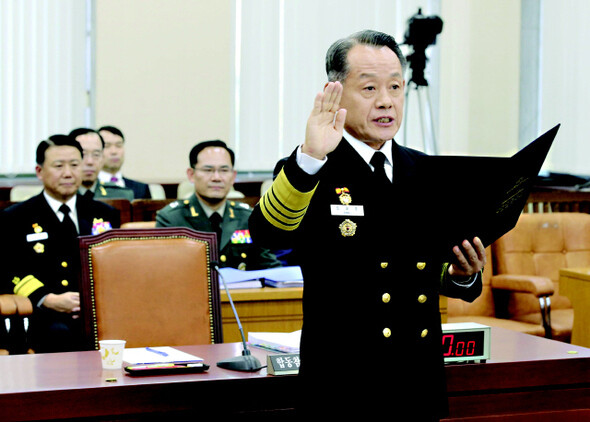hankyoreh
Links to other country sites 다른 나라 사이트 링크
Joint Chiefs of Staff nominee says he’d order preemptive strike on N. Korea

By Kim Kyu-won, staff reporter
Adm. Choi Yoon-hee, a nominee for Chairman of the Joint Chiefs of Staff, said he would carry out a preemptive strike if there were signs of imminent use of a biochemical weapon by North Korea.
This is the first time the South Korean military or government has said it would respond to the potential use of biochemical weapons with a preemptive attack.
Choi’s remarks came during a confirmation hearing on Oct. 11 before the National Assembly National Defense Committee. Speaking in response to a question from Yoo Seong-min, a Saenuri Party (NFP) lawmaker and the committee’s chairman, Choi said biochemical weapons were “included in the situations that qualify for a preemptive attack.”
Noting the military’s policy of a preemptive attack if signs of an imminent nuclear attack by North Korea were detected, Yoo had asked whether Yoon also had a “concept of a preemptive attack for biochemical weapons.”
Choi went on to say, “Biochemical weapons are weapons of mass destruction (WMD) like nuclear weapons, so if we see signs of imminent use, we will carry out a preemptive attack.”
Military officials, including Minister of National Defense Kim Kwan-jin, have previously said they would carry out a preemptive attack in the event of signs that a nuclear attack by North Korea was imminent.
The government also plans to introduce a “kill chain” by 2020 that would allow it to carry out a preemptive attack to neutralize any nuclear weapons or missiles when signs of their imminent use are detected. The Ministry of National Defense has plans for a three-level response system for nuclear weapons and other WMDs, with “risk” as the first level, “sign of imminent usage” as the second, and “usage” as the third.
Yoo also raised eyebrows with remarks criticizing the last and current conservative administrations’ approach to the military budget.
“Under the administration of Roh Moo-hyun, who was pushing for a transfer of OPCON [wartime operational control], the national defense budget rose by 8.8%, but under Lee Myung-bak it dropped to 5.3%, and in the first year of the Park Geun-hye administration it has fallen to 4.2%,” he said. “This is not something a conservative administration that professes to be concerned about national security should be doing.”
He also asked, “How are we supposed to have a kill chain and missile defense with that kind of budget?”
He went on to ask if Yoon had any suggestions for Kim and Park.
“I don’t really understand the defense budget issue either,” Yoon replied. “I plan to do my best to ensure that our policies and budget move together.”
But evidence suggests that the South Korean military is even less prepared for an OPCON transfer now than it was in 2009, when the date was first postponed.
Democratic Party lawmaker Ahn Gyu-baek noted that the Ministry of National Defense had said preparedness was at 65% in 2009, but only 61% recently.
“How could the preparedness level actually decrease?” Ahn asked.
Choi replied that it was the result of “new threats, including nuclear weapons.”
Um Hyo-shik, head of the Joint Chiefs of Staff public relations office, explained, “It’s difficult to express the level of preparedness in numbers. We don’t need to put too much meaning in the actual figure.”
Choi also ended up with egg on his face at one point when the opposition rebutted his affirmative response to a leading question from the Saenuri Party about the negative effects the OPCON transfer would have on the economy.
The question came from Saenuri Party lawmaker and former Defense Security Command chief Kim Jong-tae, who asked, “If OPCON is transfer, will stock prices go up or down?”
Choi replied, “They would fall.”
Shortly thereafter, Democratic Party lawmaker Kim Kwang-jin noted that stock prices rose on the days the Roh administration reached the agreement with the US and the two countries’ defense ministers signed it.
“They also dropped the day the Lee Myung-bak administration agreed to postpone the transfer,” Kim added.
Choi replied that he would be “more careful answering future questions.”
Please direct questions or comments to [english@hani.co.kr]

Editorial・opinion
![[Column] Is Korean democracy really regressing? [Column] Is Korean democracy really regressing?](https://flexible.img.hani.co.kr/flexible/normal/500/300/imgdb/original/2024/0705/2917201664129137.jpg) [Column] Is Korean democracy really regressing?
[Column] Is Korean democracy really regressing?![[Column] How tragedy pervades weak links in Korean labor [Column] How tragedy pervades weak links in Korean labor](https://flexible.img.hani.co.kr/flexible/normal/500/300/imgdb/original/2024/0703/8717199957128458.jpg) [Column] How tragedy pervades weak links in Korean labor
[Column] How tragedy pervades weak links in Korean labor- [Column] How opposing war became a far-right policy
- [Editorial] Korea needs to adjust diplomatic course in preparation for a Trump comeback
- [Editorial] Silence won’t save Yoon
- [Column] The miscalculations that started the Korean War mustn’t be repeated
- [Correspondent’s column] China-Europe relations tested once more by EV war
- [Correspondent’s column] Who really created the new ‘axis of evil’?
- [Editorial] Exploiting foreign domestic workers won’t solve Korea’s birth rate problem
- [Column] Kim and Putin’s new world order
Most viewed articles
- 110 days of torture: Korean mental patient’s restraints only removed after death
- 2Months after outcry over “torture devices,” Justice Ministry proposes more restraints for immigratio
- 3Beleaguered economy could stymie Japan’s efforts to buoy the yen
- 4[Column] Is Korean democracy really regressing?
- 5Koreans are getting taller, but half of Korean men are now considered obese
- 6[Column] How tragedy pervades weak links in Korean labor
- 7Former bodyguard’s dark tale of marriage to Samsung royalty
- 8Real-life heroes of “A Taxi Driver” pass away without having reunited
- 9[Editorial] Exploiting foreign domestic workers won’t solve Korea’s birth rate problem
- 10Democrats ride wave of 1M signature petition for Yoon to be impeached